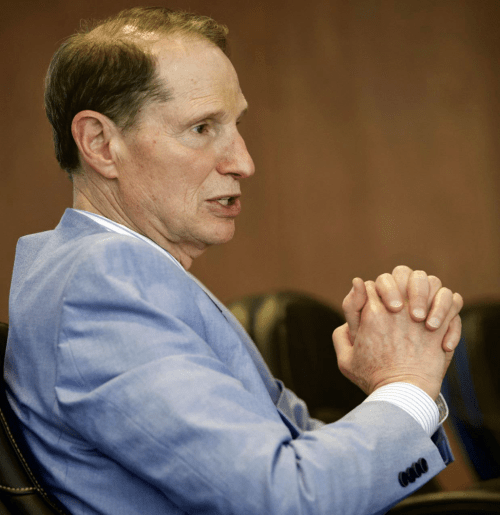Wyden: Use automatic economic triggers for future unemployment benefits
Published 12:00 pm Saturday, May 9, 2020

- U.S. Sen. Ron Wyden said the coronavirus pandemic isn’t going away soon, and neither is the economic downturn resulting from the resulting shutdown of public life and business activity.
U.S. Sen. Ron Wyden says an extension of unemployment benefits, a likely prospect as more laid-off workers file claims in Oregon and nationally, should be tied to automatic economic triggers.
He said the coronavirus pandemic isn’t going away soon — and neither is the economic downturn resulting from the resulting shutdown of public life and business activity. Without an extension of benefits and added federal spending, he said, the Congressional Budget Office has projected a national unemployment rate of 9.5% by the end of 2021 — three times what it was before the pandemic hit.
“My view is that Congress shouldn’t let families experience that level of unnecessary financial pain and suffering without a helping hand,” he said.
The U.S. unemployment rate hit 14.7% in April, the highest rate since the Great Depression, as 20.5 million jobs vanished in the worst monthly loss on record.
Wyden responded to Republicans, who are the Senate’s majority party and have questioned whether Congress needs to do more beyond the $3 trillion it already has passed to shore up the economy. Debate has already started about what should be in a follow-up aid plan.
“I think that when these unemployment numbers come out, I think Republicans are going to find it hard to stiff-arm the needs of workers and families,” he said Thursday in a conference call with reporters. “What I am going to be saying to them … is that this is a way to use objective market-based criteria to drive the next decision on unemployment insurance — and you shouldn’t play politics with America’s economy.”
More than 33 million Americans, and 381,800 Oregonians, have filed unemployment claims since March 15. Oregon’s net job losses during the Great Recession were 147,800.
Wyden is the top Democrat on the Senate Finance Committee, which writes tax legislation including the employer taxes that go into state unemployment trust funds. The states manage their funds under federal guidelines.
Along with the Republican chairman of the committee and Treasury Secretary Steven Mnuchin, Wyden secured a $600-per-week addition of unemployment benefits through July 31, a 13-week extension of benefits on top of the normal 26 weeks through March 2021, and the expansion of coverage to self-employed, part-time and gig workers, freelancers and independent contractors. Those changes were part of the $2.2 trillion coronavirus relief act, which President Donald Trump signed on March 27.
Wyden has said that unemployment benefits should provide “100% wage replacement,” not the partial amounts that have been paid to laid-off workers since the system began during the Great Depression.
“The unemployment system, created in the 1930s, needs a remodel for a different century,” he said.
Specific triggers
Wyden proposes that, after July 31, the $600-per-week addition in benefits remains as long as a state’s three-month average unemployment rate exceeds 11%. When the rate drops by a percentage point, the benefit is reduced by $100 per week, until it phases out at 6%.
“This ensures that you have a phased approach to benefits that do not disappear overnight,” he said.
For the 13-week extension, it would stay in place if a state’s unemployment rate exceeded 5.5% after March 2021. If a state’s rate was at 6.5%, the extension would be 26 more weeks for a total of 52 weeks; at 7.5%, 39 more weeks, and at 8.5%, 52 more weeks. A “soft” cutoff would enable a laid-off worker to receive the extended benefits even if the state’s unemployment rate dropped below the threshold during the period.
Economic triggers also were used during the Great Recession to determine levels of unemployment benefits, although critics said at the time they were cumbersome. The maximum benefit period then was 99 weeks, and the triggers were phased out in 2013.
Wyden said the use of economic triggers would put unemployment benefit payments beyond the reach of political maneuvering during an election year.
He said if Trump loses his re-election bid, but Republicans maintain their majority in the Senate, “Mr. McConnell will refuse a penny of additional stimulus,” referring to GOP leader Mitch McConnell.
Wyden also criticized Trump, who had launched his re-election bid on the basis of a strong economy that has collapsed in recent weeks.
“The president is back on a happy-talk program, essentially denying that the pandemic is even a major crisis,” he said. “The bottom line is clear: The pandemic is getting worse in several large areas of the country, testing is still way too low, and Americans are understandably still terrified as thousands of people die every day. The economy is driven by the consumer … and what I have just described is a recipe for sustained economic trouble.”









